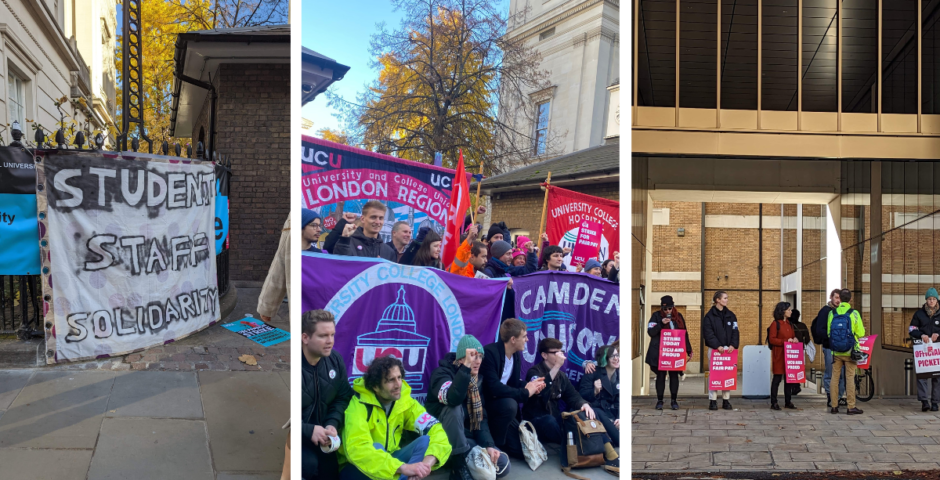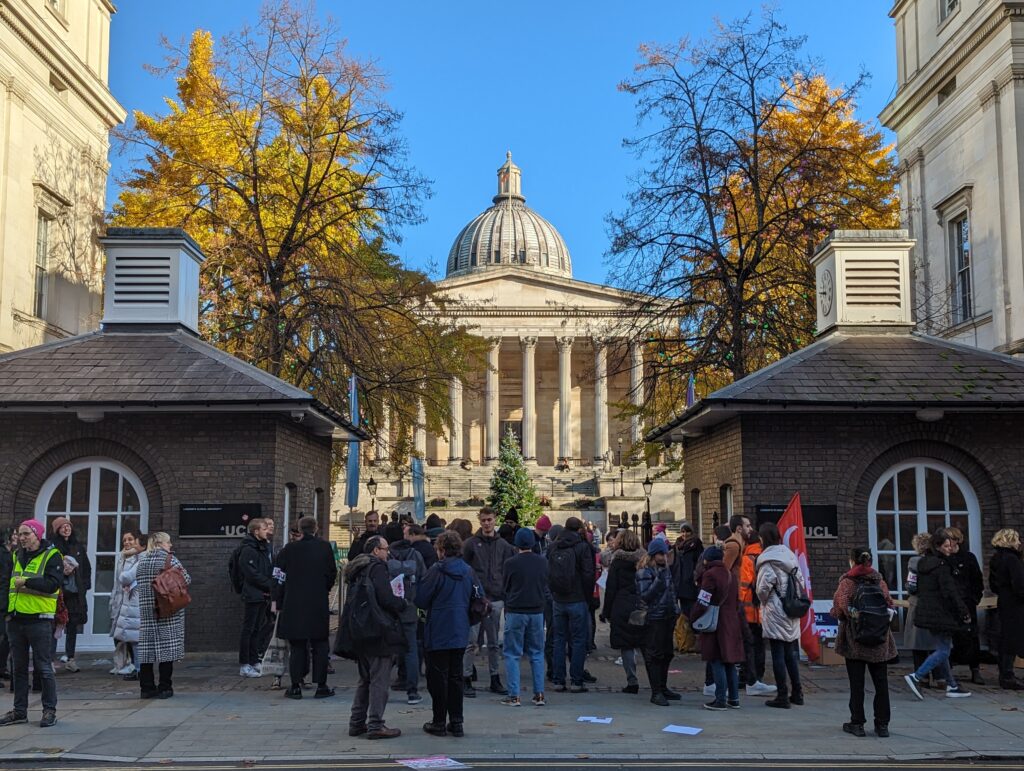
‘I refuse to treat my students as customers’: UCL lecturers and students on the strikes
‘Supporting the strikes is supporting your own education’
November 24th marked the beginning of the UCU’s first-ever run of national strikes after an overwhelming referendum result saw 150 universities commit to strike action.
Outside UCL’s main quad, students and lecturers gathered on the picket line to strike again this year due to disputes over pay and workload. Chants of, “No ifs, no buts, no education cuts,” rang out as more and more supporters joined the strikes along the course of the two days.
With students, staff and student unions taking sides, we took to the streets to see what people had to say both on and off the picket lines.
What is the UCU and why are they striking?
The University and College Union (UCU) is the UK’s largest trade union for staff working in further and higher education. 31 London institutions have taken to the picket line after a referendum held in October 2022 saw members vote heavily in favour of strike action.
The UCU’s demands mainly focus on pay and pensions, with members specifically protesting a real terms pay cut of 25 per cent since 2009, and a pension cut of 30-35 per cent which came into effect in April 2022. To combat this, the UCU is demanding a reversal of cuts to the pension scheme. A pay uplift of either 12 per cent, or the rate of inflation plus two per cent has also been demanded, depending on which is higher.
Why are you striking?
The UCL Students’ Union has outlined its stance after a referendum of 6,290 votes came down in favour of supporting strike action, increasing to 68.7 per cent of students supporting the strikes from last year.
“We’ve seen a massive cut in real terms pay. There’s a large gender, ethnic and disability pay gap. Most of us are on precarious contracts as well. Universities keep taking on more students and not employing enough staff, says Waseem Ahmed, a PhD student and TA from the Institute of the Americas.
“I refuse to treat my students as customers and they shouldn’t fall into the trap of thinking the university wants to treat them as customers,” says Ludovic, a lecturer for the Anthropology department.
“For international students, they are human and they move all the way across the world to a country they don’t understand, and because we treat them as a customer, we don’t treat them particularly well and teaching them well is providing the context in which we can provide them with the support they need.”
Dr Kesewa John, a lecturer at the Institute of the Americas, said:
“I know that they’ve asked some lecturers to take on 50 personal tutees. If you’ve ever had meetings with your personal tutor or needed them, students should think it’s crazy that a single person should be the personal tutor for 50 people. That’s not their main job, they are lecturers, they’ve got to teach, they’ve got to take their classes. You can’t get a good education if staff are constantly overworked. It’s going to have real world consequences.”
What are people saying about the strikes?
Visiting the picket line for UCL’s Anthropology department, it was a positive scene with staff and students chatting and playing table tennis before a colourful display of themed posters and a protest tapestry. The scene outside the main quad was similar, with students and staff mingling amongst the crowd as they organised to protest in different areas outside UCL throughout the day.
“It’s been very positive. Lots of energy, it’s quite a family friendly environment. Especially the last couple of years, there’s been a real sense of enthusiasm, says Waseem.
Robert Delaney, a first year student at Institute of the Americas said, “When we come together in this way, it produces a fun experience and fun atmosphere which was particularly present today. We had a great turnout.”

What do UCL students think?
Upon encountering their first UCU strike, first year Archaeology student Eli Brown said, “All members of our university should be respected in their position, and that’s what I really hope comes from this.”
However, second year medical sciences student Joe had a different opinion, saying, “I have had 3 lectures cancelled, which is unacceptable. I am inclined to support our staff for the work that they do, but for someone who is already struggling to pay for university, to see my tuition fees going to waste is frustrating.”
“The strike action is incredibly important for the undergraduate body. If UCL paid its members of staff properly, it would increase quality of education.” says Robert.
“Its a bad way to look at education to think that you are losing money from the strikes, like every 15 minutes is this amount of money lost. The quality of our education depends on our lecturers being incentivised to come in and do their job. Without lecturers, university is nothing. If they do not get the pay they deserve then there will be no university and you will have nowhere to be.”
“Without a shadow of a doubt it is in the students best interests to support the strikes. Supporting the strikes is supporting your own education.”

What is the overall goal?
The London Tab spoke to Branch President of the UCU, Sean Wallace, to learn more about the goals they had for the strikes this year.
“We’re not trying to hurt the students. We’re trying to make it clear that we can mobilise our members. Yesterday, we had about 200 people at the picket line.”
On disputes over pay, Sean said, “In effect, they’re asking you to work for free for a month.”
Why do you think UCL hasn’t listened to the demands?
“Before the fees were in place, universities saw themselves not as businesses, but as institutions. They weren’t trying to expand, and they weren’t trying to compete. Once tuition fees were introduced, it was clear that if you take in large amounts of students you can make large amounts of money.”
“The university management can clearly see that if they don’t expand and compete, their competitors will. So you can see why they are doing it. UCL has just gone to town on this. They have really expanded. And you can see other universities be in trouble because they’ve expanded. They’re all building and buying estates to house people.”
Do you think that UCL’s priorities have changed to become more of a business than a higher education institution?
“The Provost has been very specific. They’re trying to reframe the university and maximise this model. This is not why we got into higher education.”

Photo via @UCL-UCU on Twitter
UCL has been contacted for comment.
Related stories recommended by this writer:
• Here’s how the university strikes will impact you as London students
• Thousands of students and grads are claiming uni compensation for lost time over strikes
• Up to 140 Birkbeck staff threatened by ‘knee-jerk job cuts’ following student number drop










































